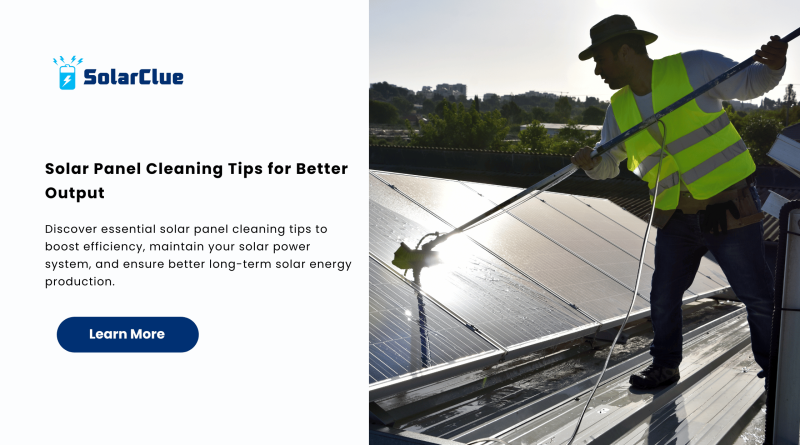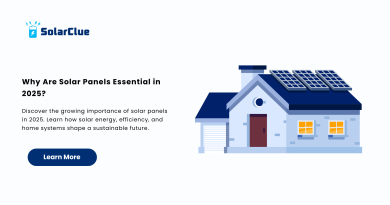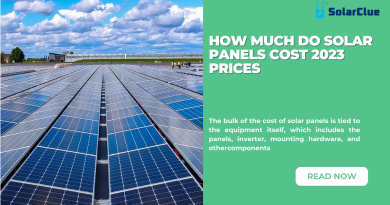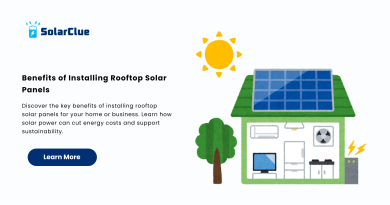Solar Panel Cleaning Tips for Better Output
Keeping your solar panels clean isn’t just about aesthetics — it’s critical for maximizing your system’s energy efficiency. A well-maintained solar panel can deliver up to 20% more power than a neglected one. Over time, dust, bird droppings, leaves, and other debris accumulate on the surface, blocking sunlight and reducing efficiency. That’s where regular solar panel cleaning comes into play.
Table of Contents
- 1 How Dirt and Debris Affect Solar Efficiency
- 2 When and How Often Should You Clean?
- 3 Best Time of Day to Clean Solar Panels
- 4 Essential Solar Panel Cleaning Tips
- 5 Can You Use a Hose to Clean Solar Panels?
- 6 DIY vs. Professional Cleaning
- 7 Common Mistakes to Avoid
- 8 Benefits of Clean Solar Panels
- 9 Tools You’ll Need for Cleaning
- 10 How Weather Affects Cleaning Schedules
- 11 Maintenance Beyond Cleaning
- 12 Eco-Friendly Cleaning Solutions
- 13 Safety Tips During Cleaning
- 14 Solar Panel Cleaning Myths Debunked
- 15 Why Monitoring System Performance Matters
- 16 Final Thoughts: Clean Panels, High Performance
- 17 FAQs
How Dirt and Debris Affect Solar Efficiency
One of the most common issues that affect solar panel output is dirt build-up. Layers of grime create a barrier between the panel and the sun, significantly decreasing energy generation. Whether it’s pollen, bird droppings, or pollution, these substances reduce sunlight absorption and overall solar energy performance.
When and How Often Should You Clean?
The frequency of solar panel cleaning depends on your location. If you live in a dry, dusty area or near pollution sources, clean your panels every 2-3 months. In less harsh environments, twice a year may be sufficient. Always check performance levels via your monitoring system — a sudden dip might indicate it’s time for a clean.
Best Time of Day to Clean Solar Panels
Early morning or late afternoon is ideal for cleaning. During these times, the panels are cooler, which helps prevent streaking caused by quick evaporation. Plus, you avoid the risk of cracking the glass due to sudden temperature changes.
Essential Solar Panel Cleaning Tips
-
Use a soft brush or a sponge with mild soap and water
-
Avoid abrasive materials or harsh chemicals
-
Rinse thoroughly to prevent residue buildup
-
Use a squeegee to remove excess water and avoid streaks
-
Never clean panels during the hottest part of the day
Can You Use a Hose to Clean Solar Panels?
Yes, using a garden hose with gentle pressure is often sufficient for light cleaning. However, avoid pressure washers, which can damage the panel’s surface or frame.
DIY vs. Professional Cleaning
DIY solar panel cleaning is cost-effective but may lack thoroughness. For tall rooftops or stubborn grime, hiring professionals ensures safety and effectiveness. They often use deionized water and specialized equipment for deep cleaning, maintaining the integrity of your solar power system.
Common Mistakes to Avoid
-
Using abrasive sponges or brushes
-
Cleaning during peak sunlight hours
-
Standing on panels or applying too much pressure
-
Neglecting safety precautions on rooftops
Benefits of Clean Solar Panels
Clean panels increase power output, extend the life of your solar power system, and improve your ROI. Proper solar panel maintenance can even help you qualify for warranty claims, as many providers require proof of upkeep.
Tools You’ll Need for Cleaning
-
Soft-bristled brush or microfiber cloth
-
Bucket with warm soapy water
-
Garden hose with spray nozzle
-
Squeegee with long handle
How Weather Affects Cleaning Schedules
In monsoon-prone regions, rain may help rinse off light dust, but don’t rely on it alone. Areas with snow need cleaning once the snow melts to ensure performance. In desert-like conditions, regular dust removal is crucial for energy output.
Maintenance Beyond Cleaning
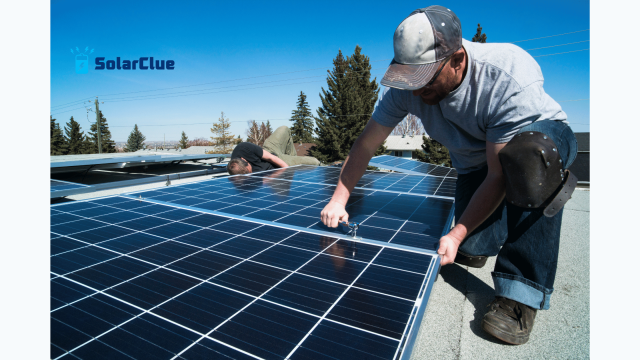
Cleaning is just one part of solar panel maintenance. Regular inspections for cracks, loose wiring, and inverter performance are also vital. A holistic approach ensures your solar energy system works flawlessly year-round.
Eco-Friendly Cleaning Solutions
If you’re concerned about environmental impact, opt for eco-friendly soaps or vinegar-water mixes. These are safe for your panels and the planet.
Safety Tips During Cleaning
-
Use a harness when working on rooftops
-
Ensure ladders are stable
-
Turn off the solar power system before cleaning
-
Never touch electrical components with wet hands
Solar Panel Cleaning Myths Debunked
Myth: Rain cleans panels effectively.
Fact: Rain only removes loose dirt and often leaves behind streaks and residue.
Myth: More water equals better cleaning.
Fact: Proper technique is more important than quantity of water.
Why Monitoring System Performance Matters
Modern solar setups include monitoring tools that show how well your system performs. If your power output drops without a weather-related reason, it’s likely time for solar panel cleaning. Regular monitoring helps you act before significant losses occur.
Final Thoughts: Clean Panels, High Performance
Regular solar panel cleaning is key to maximizing energy production and extending the lifespan of your investment. Don’t wait for visible dirt — schedule routine cleanings and watch your solar energy savings grow. To explore professional cleaning options or learn more, check out solarclue.com or visit blog.solarclue.com for expert insights and more useful content.
FAQs
1. Can I clean solar panels with tap water?
Yes, but distilled or deionized water is better to prevent mineral deposits on the surface.
2. How long does it take to clean a solar panel system?
Typically, 30–60 minutes depending on the size and dirt level.
3. Are solar panel cleaning services expensive?
Costs vary, but average prices range from $100–$300 depending on system size and accessibility.
4. Is it okay to clean solar panels during winter?
Yes, but ensure snow is cleared safely and only clean when panels are not frozen.
5. Does cleaning really improve output?
Absolutely. Clean panels can produce up to 20% more energy than dirty ones.
Want to take your solar system performance to the next level? Dive into more expert guides and tips at blog.solarclue.com — your go-to source for all things solar!

